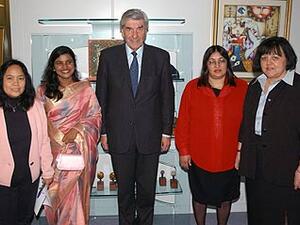"Business as usual" no longer acceptable in Africa
"Business as usual" no longer acceptable in Africa
GENEVA, Dec. 17 (UNHCR) - High Commissioner Ruud Lubbers says "business as usual" is no longer acceptable in Africa and "work must start now" to find permanent solutions to the continent's long-term refugee crises.
Lubbers addressed a meeting of some 50 African states Friday following an unprecedented ministerial-level meeting of 156 countries which reaffirmed the international community's commitment to the 1951 Geneva Refugee Convention.
Because Africa continues to be one of the most intractable global problems - there are more than six million people 'of concern' to UNHCR throughout the continent - countries decided to have their own follow-up gathering to focus specifically on their problems.
At its conclusion, the African meeting urged more international help in tackling the root causes of displacement and financial help for countries with large refugee populations, said more attention needed to be focused on 'conflict prevention', and expressed concern that some 'refugee exporting countries' were not doing enough to solve their own domestic problems.
"We cannot go on with business as usual," Lubbers told the meeting. "We have to speak together and see what to do about protracted refugee situations in Africa and how we can improve the protection regime."
Even if refugees could not immediately return home, they should still be given the opportunity to live meaningful lives, he said. "We have to increase local opportunities so that refugees become self-sufficient and are empowered with sufficient skills to become useful members of local communities."
The High Commissioner added, "We therefore have to re-emphasize the importance of education and other self-reliance strategies" and "work must start now in order to achieve good results."
For their part, African states said they faced a Catch-22 situation. They would do more for refugees, but were hampered by the lack of resources and noted that widespread unemployment risked domestic unrest if they allowed refugees to work. They urged traditional donor countries to provide more 'burden-sharing' in coping with the global refugee problem.
Some delegates said if they encouraged the local integration of refugees, the uprooted people themselves would have little incentive to return home, and states which had produced the refugees in the first place would also be disinclined to mend their ways and seek permanent solutions.
A UNHCR proposal for adoption of a resolution to separate armed units from civilian refugee populations won the support of several delegations which nevertheless expressed concern about who would then monitor the armed groups.
Erika Feller, director of UNHCR's Division of International Protection, explained the organization's mandate was limited to the care of civilians and their responsibility remained that of host nations.






